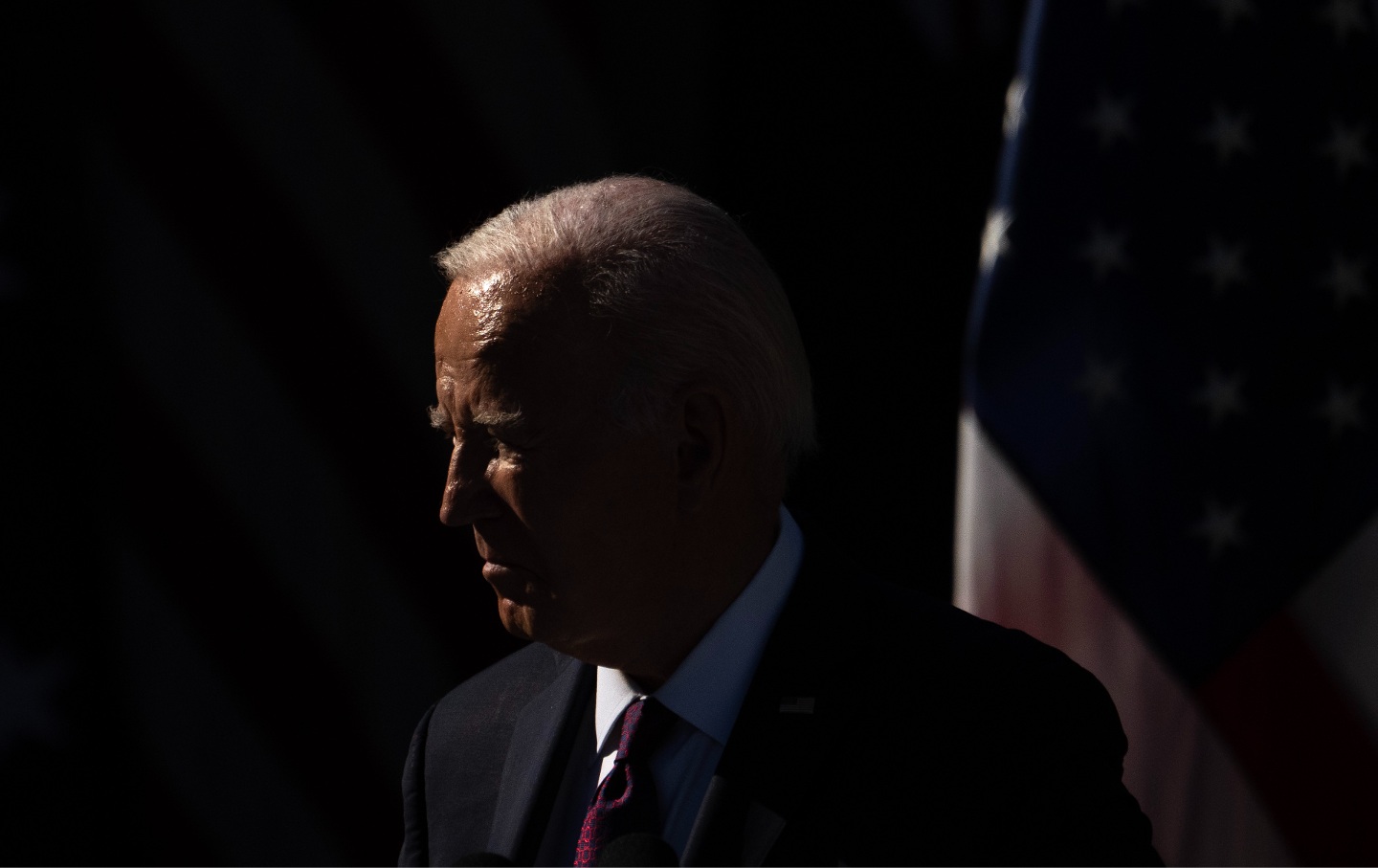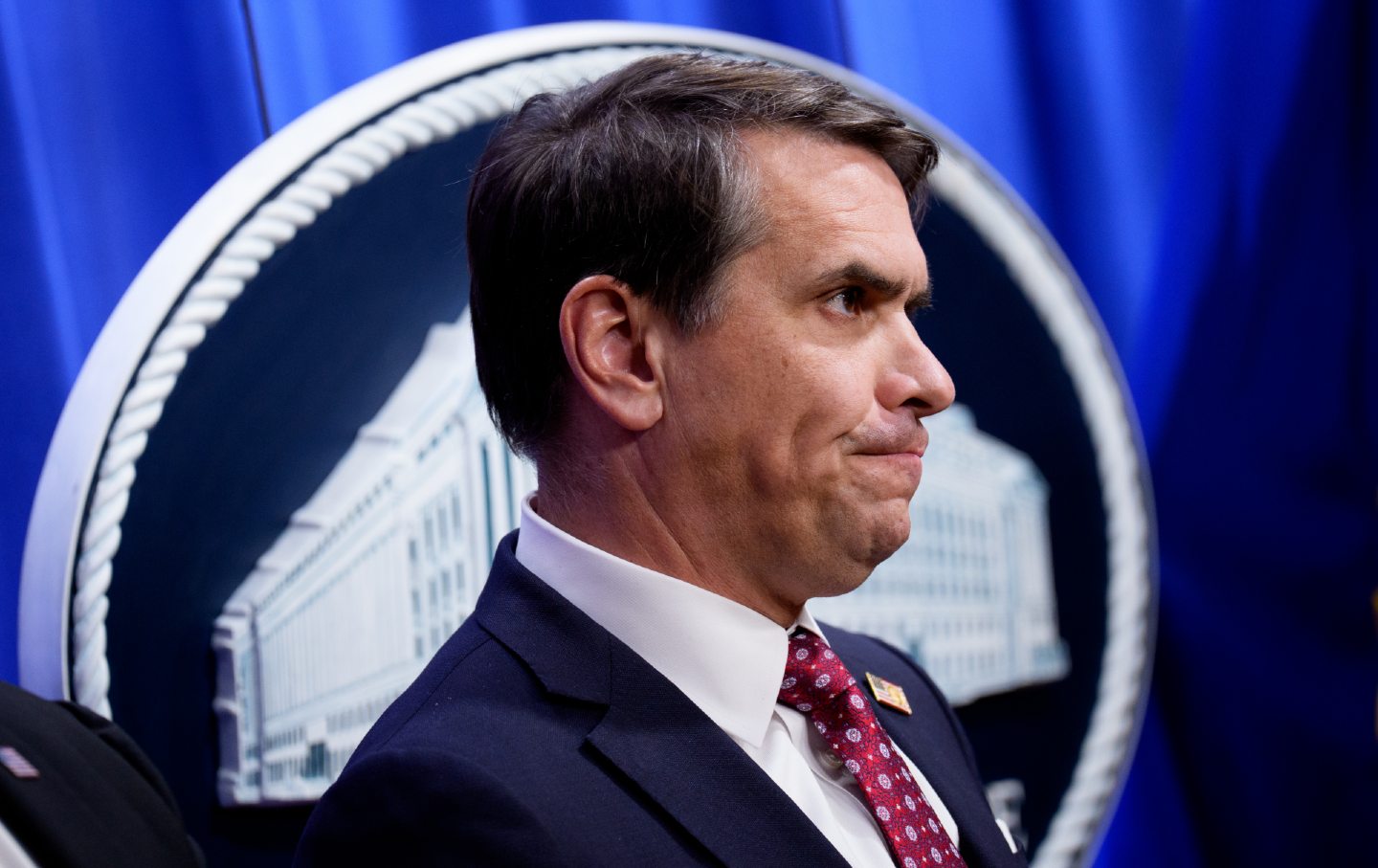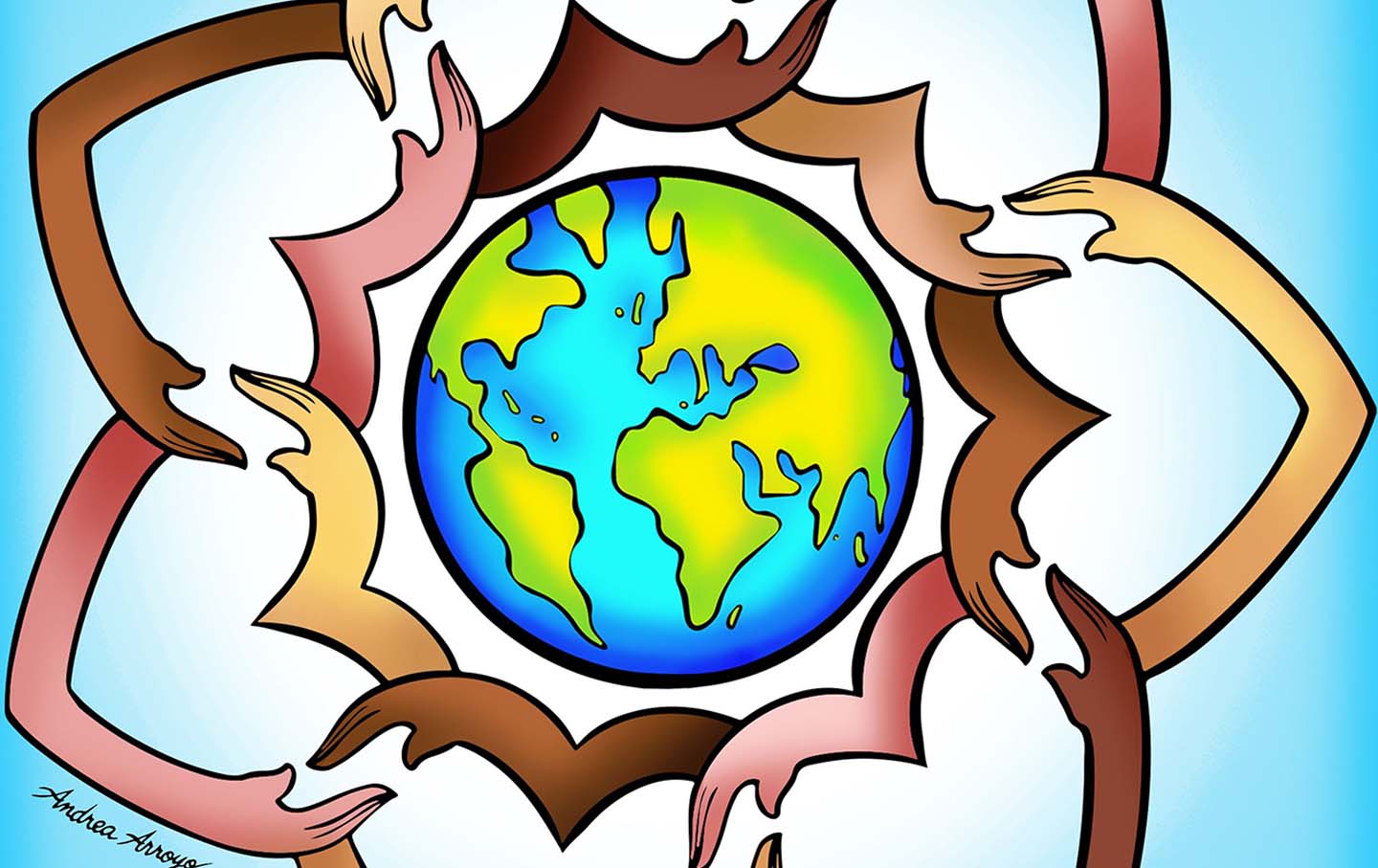Muslim and Arab Voters Are Sending Biden a Stark Warning—and He’d Better Pay Attention
These voters may be a deciding factor in Biden’s reelection. His backing of Israel’s assault on Gaza could turn them against him for good.

Joe Biden during a press conference with Australian Prime Minister Anthony Albanese in the Rose Garden at the White House on October 25, 2023.
(Drew Angerer / Getty Images)Many Americans are expressing outrage over the Biden administration’s handling of the continued Israeli bombardment of Gaza and the ongoing crisis surrounding the hostages taken by Hamas. Protests erupted across major US cities, including Washington, calling for a cease-fire as the best way to stop the rising death toll and secure the hostages—something the White House has firmly refused to support.
I doubt that these protesters expected Biden to completely ignore Israel’s security concerns; as anyone aware of American politics understands, US administrations will always support their primary ally in the Middle East, especially in the wake of an attack that killed hundreds and led to so many people being taken hostage.
But while people might have expected Biden to support an ally of the US government, they did not think that meant Biden would support whatever that ally did. So as the toll from Israel’s indiscriminate bombing of Gaza skyrockets, President Biden’s refusal to push back meaningfully has horrified people—in particular, Muslim and Arab Americans.
Actually, to say that Muslim and Arab communities in this country are horrified is probably an understatement. The sense of shock and betrayal is real and shattering. And it is leading many Muslims and Arabs to a conclusion that should worry the White House: that they can no longer vote for Joe Biden.
To be clear, it’s not as though every Arab and Muslim American was a die-hard fan of Biden. For many, a vote for Democrats was seen as the lesser of two evils. But the result has been the same: these communities overwhelmingly back Democrats in presidential elections.
I myself have voted Democratic for my entire adult life, even when the candidate has been disappointing. I told myself that, no matter how much I disliked the party’s policies on the Middle East generally and Israel-Palestine in particular, voting Democratic was a form of harm reduction. But watching the Biden administration sideline Palestinians for nearly three years, and now seeing Biden fuel the flames of the violence that has killed over 7,000 Palestinians and 1,400 Israelis in the last few weeks, it is very, very difficult for me to see myself casting my ballot for him in 2024.
To the average American liberal, this may seem nonsensical. I do not claim for a moment that the majority of Americans will react the same way, as I don’t think what happens in the Middle East is at the forefront of most peoples’ minds. In fact, as one analyst notes, Biden’s backing of Israel might even be politically useful in many instances.
But there is a logic and a context, that has been missing in the analysis of this issue.
First, there are millions of Democratic voters with very different views from the DC establishment. Polls show that 80 percent of such voters either “strongly” or “somewhat” agree with the call for a cease-fire and a de-escalation in Gaza—a position flatly at odds with that of the White House.
And, as NBC recently reported, Muslim and Arab Americans in key swing states are expressing clearly that they will not be voting for Biden in the next election, come what may.
Look closer, and it is easy to see that Biden has a political problem on his hands. Muslim voters have been found to place an emphasis on a candidate’s foreign policy views. Muslim turnout in 2020 exceeded the national average, and studies showed that their votes helped tip the scales to Biden in states like Georgia and Pennsylvania. Muslims are, on average, much younger than the rest of the US population, and young people were a key constituency for Biden in 2020. And polls show that Biden is already trailing Donald Trump in most of the swing states that will decide the 2024 election, several of which have significant Muslim populations.
Taken together, it seems clear that this is not a community whose votes the White House can afford to lose.
But Biden’s actions in the past three weeks have sent the message to Muslim and Arab voters that his administration is not concerned enough about preventing violence, sparing civilians, or even freeing the hostages, let alone addressing the broader issues that animate the conflict. On social media and in their organizations, Muslims and Arabs have made the argument that the nature of Biden’s support has had deadly results here in the US, sparked mass mobilization across the globe, and made a wider regional conflict ever more likely. Even normally acquiescent Arab allies of the US— Egypt, Jordan, and the Palestinian Authority—canceled their summit with Biden last week, fearful of looking complicit in the ongoing attack and facing more protest in their own backyards.
Popular
“swipe left below to view more authors”Swipe →While the nature and scale of the Hamas assault was staggering, the fact that violence has escalated is something that experts say was inevitable. And, most importantly, as the only country in the world capable of exerting pressure on both Israel and the Palestinians, the US should have taken steps, at a minimum, to not exacerbate the situation on the ground—maybe even to try to avert disaster. Instead, to many Arab and Muslim Americans as well as their American Jewish allies, it seems the Biden administration has facilitated the rush to the abyss. So what we are witnessing now is compounded disappointment.
Here is a non-exhaustive list of those disappointments.
First, at any point over the nearly three years of his presidency, Biden could have pressured the Israelis on settlement activity. His administration could have imposed consequences on the far-right Israeli government for aiding and abetting settler violence—violence that reached the highest level since 2006 this year. The constant loss of life has obviously been unacceptable to Palestinians, motivating new militias, and making the conflict even more zero-sum. But the Biden administration made no meaningful attempt to address the issue of settler incitement.
The Biden administration could have also supported the attempted Palestinian elections in 2021, forcing some level of accountability on Palestinian leadership and giving young Palestinians a sliver of hope. But despite the usual lofty rhetoric on democracy we have come to expect from American leaders, the Biden administration was silent. Elections were canceled.
At yet another point, Biden could have taken advantage of the critical opening that occurred when Israelis protested Prime Minister Netanyahu’s government for months on end, with some even finally addressing the role of occupation in distorting their own governance. The protests were a clear opportunity for the Biden administration to push the embattled Netanyahu to not only make improvements in governance internally but also ease his government’s repression of Palestinians, maybe even discuss new realities and conditions. But Biden didn’t do any of that.
The normalization deals between Arab autocrats and their Israeli counterparts, initially presided over by the Trump administration, could have been another area to change course. The Abraham Accords signed between Israel, the UAE, Bahrain, Morocco, and Sudan were the first significant normalization of relations between Arab states and Israel in decades. However, rather than achieving peace, the deals have been heavily criticized as providing the Israeli government even more cover for escalations in violence, in addition to the domestic impacts on Arab societies that have seen these deals used to crush them further. I have previously argued that these deals are in fact a form of authoritarian conflict management; others have simply characterized them as arms deals by a different name. For all the “peace” supposedly achieved by these treaties, the level of violence in Israel-Palestine itself rose. But instead of correcting course, the Biden administration threw its weight behind normalization. It became a cornerstone of the president’s Middle East policy.
And finally, Muslim and Arab Americans have watched in alarm at Biden’s reaction to the destruction of Gaza. Instead of acting quickly for the sake of the civilians involved, it seems to many in the community that the Biden administration gave the Israeli government “the green light” for action it wanted to take. These actions have included collective punishment, the targeting of civilians and civilian infrastructure, and the utilization of weapons like white phosphorus bombs—all of which human rights organizations have identified as war crimes.
Despite this, the Biden administration has prevented a discussion of de-escalation, vetoed UN resolutions for humanitarian aid, and inadequately responded to the American citizens stuck in Gaza. Even the much-lauded humanitarian support that the Biden administration helped to secure has been strongly criticized as “a drop in the bucket” by UN officials, and “a massacre by appointment” or “too little too late” by journalists and analysts.
In almost every way, and despite many opportunities to push the people of the region away from catastrophe, Biden has dragged them closer.
In his latest speech to the nation, Biden requested an aid package to support Ukraine against Russia, and Israel against Hamas. He framed this as a step to protect and build “the arsenal of democracy,” and promote global security. This is particularly ironic to Arabs and Muslims, given America’s role in subverting democratic accountability in the region at large, and in the Palestinian territories in particular. To many in and from the region, there is a sense that they fall outside the humanity that Biden speaks of, that the international order of democracy and security that Biden envisions does not actually include Arabs and Muslims. So for those American citizens with ties to the region, the ethical choice becomes not to enable this presidency any further.
While Republican disregard for Muslim and Arab lives is clearly on display, some Muslim and Arab Americans also feel like the Democratic Party largely takes their vote for granted, though Democrats’ policies never reflect as much. One Arab American friend expressed to me that, at least under Republican administrations, “Arabs could find allies” in their opposition.
Whether or not liberals agree with this calculation is irrelevant. A growing number of people are deciding that the question of how to improve the conditions on the ground in Palestine and the wider Middle East has little to do with who is president. And this should be concerning to the administration—that is, if Biden and his team can actually absorb any of these lessons. For many Muslim and Arab Americans, they are done hoping.
More from The Nation

A Trump Administration Official Says It Won’t Investigate the Killing of Renee Good A Trump Administration Official Says It Won’t Investigate the Killing of Renee Good
Deputy Attorney General Todd Blanche makes clear that the Department of Justice won’t look into the death of Renee Good—but that won’t stop Minnesota from investigating.

Martin Luther King Jr.’s Dream: Love Against Racism Martin Luther King Jr.’s Dream: Love Against Racism
As Dr. King reminded us, “Hate cannot drive out hate; only love can do that.” His words continue to call us toward justice, compassion, and the power of love to confront racism.

It’s Official: The People, Not the Politicians, Are Leading It’s Official: The People, Not the Politicians, Are Leading
In this week’s Elie V. US, our justice correspondent explores the fecklessness of the Democratic Party, MAGA racism, and fighting despite unwinnable odds.

The Week of Colonial Fever Dreams From a Sundowning Fascist The Week of Colonial Fever Dreams From a Sundowning Fascist
The news was a firehose of stories of authoritarian behavior. We can’t let ourselves drown.

Self-Appointed King of Venezuela Self-Appointed King of Venezuela
The United States attacks Venezuela and captures President Maduro. Trump claims that the US will “run” the country for oil interests.



